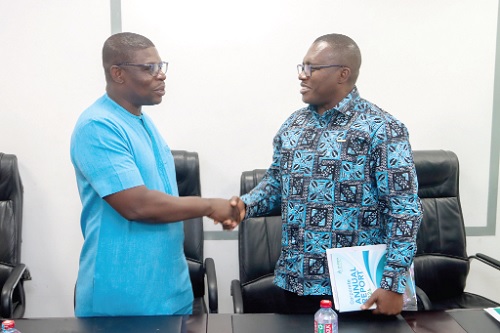Bui Power Authority (BPA) recorded a net profit of $64.5 million in 2024, almost double its projected figure of $33.6 million.
The Board Chairperson, Kwadwo Nyamekye-Marfo, who made this known, explained that the strong financial performance was driven largely by strict cost controls, prudent working capital management, and savings from unspent budgeted items.
“This positive variance of approximately 92 per cent can be attributed to the non-incurrence of certain budgeted general and administrative costs, which were hindered by liquidity challenges as well as prudent working capital management,” he added.
He made the announcement in a statement read on his behalf by the Member of Parliament (MP) for the Akan Constituency and a member of the board, Yao Gomado, at the company’s 2024 Annual General Meeting (AGM) held at its headquarters in Accra.
The Authority also benefited from the depreciation of the cedi against the dollar, which boosted its earnings.
Mr Nyamekye-Marfo further revealed that BPA’s total revenue for the year stood at $139.7 million, slightly above the budgeted $139.5 million, adding, “The profit margin of 46.2 per cent significantly outperformed the projected 24.1 per cent, underscoring the impact of its efficiency measures.”
Similarly, BPA’s net worth increased by 9.2 per cent from $700.8m in 2023 to $765.2m in 2024.
However, the company said liquidity challenges persisted due to mounting debts owed by its main off-taker, the Electricity Company of Ghana (ECG), which had constrained procurement of spare parts, implementation of capital projects, and loan servicing.
He added that environmental threats such as illegal mining and bushfires around the Bui reservoir also posed challenges.
Operations, infrastructure
The acting Chief Executive Officer (CEO) of the company, Kow Eduakwa Sam, said the Authority delivered a strong operational performance in 2024, generating a total of 1,352 gigawatt-hours (GWh) of electricity against a target of 1,333GWh.
Out of this, 1,348GWh was supplied to the National Interconnected Transmission System (NITS), with the Bui Hydro Plant contributing 94.4 per cent, the Bui Solar PV Plant 5.6 per cent, and the Tsatsadu Micro Hydro Plant the remainder.
On infrastructure, Mr Sam said BPA advanced its renewable expansion programme with 62 per cent completion of a 100MWp Solar PV project at Bui, complemented by a 15MWh Battery Energy Storage System, while also initiating feasibility studies for run-of-river projects on the Tano, Pra and Ankobra rivers and securing lands in the northern regions for solar PV developments.
Diversification
The Deputy Minister of Energy and Green Transition, Richard Gyan-Mensah, lauded BPA’s renewable initiatives but urged diversification beyond solar into mini-hydro, wind, and waste-to-energy.
He stressed that solar tariffs must remain affordable and aligned with competitive procurement policy. Acknowledging liquidity constraints, he assured government support, emphasising financial prudence, innovation, battery storage, and sustainability to advance Ghana’s green transition and protect consumers.
The General Manager in charge of operations at the State Interests and Governance Authority (SIGA), Millicent Atuguba, also commended BPA for maintaining profitability and good corporate governance despite liquidity challenges, emphasising a 20 per cent profit decline to $64.5m in 2024 due to reduced inflows.
She urged the Authority to prioritise efficiency, pay dividends by 2025, and fully comply with statutory obligations to support the country’s fiscal sustainability.
